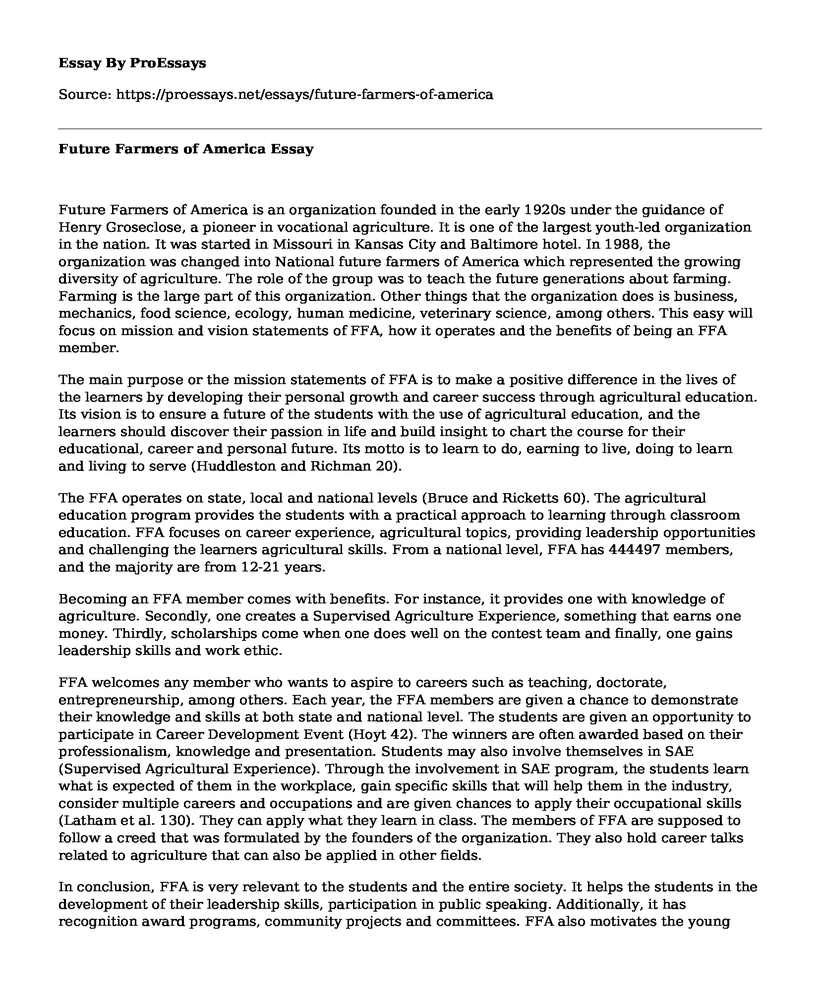Future Farmers of America is an organization founded in the early 1920s under the guidance of Henry Groseclose, a pioneer in vocational agriculture. It is one of the largest youth-led organization in the nation. It was started in Missouri in Kansas City and Baltimore hotel. In 1988, the organization was changed into National future farmers of America which represented the growing diversity of agriculture. The role of the group was to teach the future generations about farming. Farming is the large part of this organization. Other things that the organization does is business, mechanics, food science, ecology, human medicine, veterinary science, among others. This easy will focus on mission and vision statements of FFA, how it operates and the benefits of being an FFA member.
The main purpose or the mission statements of FFA is to make a positive difference in the lives of the learners by developing their personal growth and career success through agricultural education. Its vision is to ensure a future of the students with the use of agricultural education, and the learners should discover their passion in life and build insight to chart the course for their educational, career and personal future. Its motto is to learn to do, earning to live, doing to learn and living to serve (Huddleston and Richman 20).
The FFA operates on state, local and national levels (Bruce and Ricketts 60). The agricultural education program provides the students with a practical approach to learning through classroom education. FFA focuses on career experience, agricultural topics, providing leadership opportunities and challenging the learners agricultural skills. From a national level, FFA has 444497 members, and the majority are from 12-21 years.
Becoming an FFA member comes with benefits. For instance, it provides one with knowledge of agriculture. Secondly, one creates a Supervised Agriculture Experience, something that earns one money. Thirdly, scholarships come when one does well on the contest team and finally, one gains leadership skills and work ethic.
FFA welcomes any member who wants to aspire to careers such as teaching, doctorate, entrepreneurship, among others. Each year, the FFA members are given a chance to demonstrate their knowledge and skills at both state and national level. The students are given an opportunity to participate in Career Development Event (Hoyt 42). The winners are often awarded based on their professionalism, knowledge and presentation. Students may also involve themselves in SAE (Supervised Agricultural Experience). Through the involvement in SAE program, the students learn what is expected of them in the workplace, gain specific skills that will help them in the industry, consider multiple careers and occupations and are given chances to apply their occupational skills (Latham et al. 130). They can apply what they learn in class. The members of FFA are supposed to follow a creed that was formulated by the founders of the organization. They also hold career talks related to agriculture that can also be applied in other fields.
In conclusion, FFA is very relevant to the students and the entire society. It helps the students in the development of their leadership skills, participation in public speaking. Additionally, it has recognition award programs, community projects and committees. FFA also motivates the young people to make constructive contributions to their schools, homes, societies and the entire country. It helps them to advance agriculture and other related fields through educating its members some of the technical skills. FFA builds an all-around individual who can fit in the society since one is taught the leadership, communication and career skills.
Works Cited
Bruce, Jacklyn, and Kristina Ricketts. "Evaluation of the National FFA Nominating Committee Training." Journal of Leadership Education 6.1 (2007): 59-72.
Hoyt, Kenneth B. Future Farmers of America and career education. Washington, D.C.: U.S. Department of Health, Education, and Welfare, Office of Education, 1978. Print.
Huddleston, E. W., and D. B. Richman. "An Entomology Contest for the Future Farmers of America." Bulletin of the Entomological Society of America 29.4 (1983): 20-23.
Latham, Lyndsey, John Rayfield, and Lori L. Moore. "Influence of FFA Activities on Critical Thinking Skills in Texas Three-Star FFA Chapters." Journal of Agricultural Education 55.5 (2014): 126-139.
Cite this page
Future Farmers of America. (2021, Mar 06). Retrieved from https://proessays.net/essays/future-farmers-of-america
If you are the original author of this essay and no longer wish to have it published on the ProEssays website, please click below to request its removal:
- My Core Beliefs About Work
- Art and Sensory Activities in Preschool Paper Example
- Reflections on Classroom Blogging Paper Example
- Essay Sample on Measuring Intelligence in Children: Reason & Assessment
- Essay Sample on Understanding Social Stratification in China & the UK
- Essay Example on Neurotic Society: Anxiety, Mental Illness & Personality Impairment
- Paper Example on EAP vs Gen. English: In-Depth Analysis, Skills, Areas of Improvement & Conclusion







